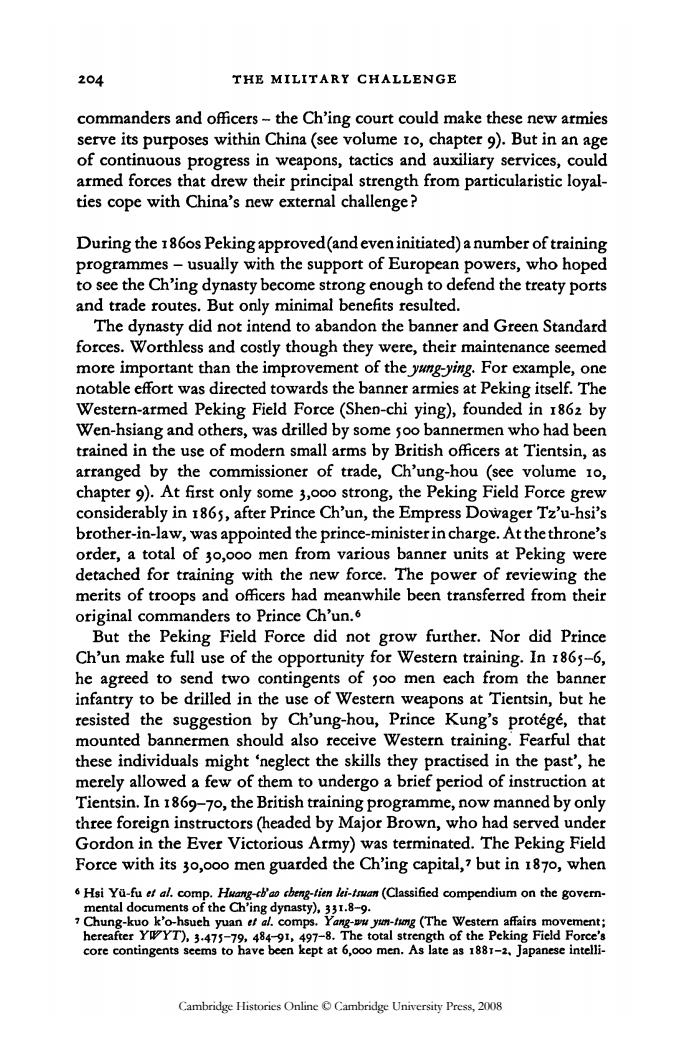正在加载图片...

204 THE MILITARY CHALLENGE commanders and officers-the Ch'ing court could make these new armies serve its purposes within China(see volume ro,chapter 9).But in an age of continuous progress in weapons,tactics and auxiliary services,could armed forces that drew their principal strength from particularistic loyal- ties cope with China's new external challenge? During the 186os Peking approved(and eveninitiated)a number of training programmes-usually with the support of European powers,who hoped to see the Ch'ing dynasty become strong enough to defend the treaty ports and trade routes.But only minimal benefits resulted. The dynasty did not intend to abandon the banner and Green Standard forces.Worthless and costly though they were,their maintenance seemed more important than the improvement of the yang-ying.For example,one notable effort was directed towards the banner armies at Peking itself.The Western-armed Peking Field Force(Shen-chi ying),founded in 1862 by Wen-hsiang and others,was drilled by some soo bannermen who had been trained in the use of modern small arms by British officers at Tientsin,as arranged by the commissioner of trade,Ch'ung-hou (see volume 1o, chapter 9).At first only some 3,ooo strong,the Peking Field Force grew considerably in 1865,after Prince Ch'un,the Empress Dowager Tz'u-hsi's brother-in-law,was appointed the prince-ministerin charge.At the throne's order,a total of 3o,ooo men from various banner units at Peking were detached for training with the new force.The power of reviewing the merits of troops and officers had meanwhile been transferred from their original commanders to Prince Ch'un.6 But the Peking Field Force did not grow further.Nor did Prince Ch'un make full use of the opportunity for Western training.In 186-6, he agreed to send two contingents of soo men each from the banner infantry to be drilled in the use of Western weapons at Tientsin,but he resisted the suggestion by Ch'ung-hou,Prince Kung's protege,that mounted bannermen should also receive Western training.Fearful that these individuals might 'neglect the skills they practised in the past',he merely allowed a few of them to undergo a brief period of instruction at Tientsin.In 1869-70,the British training programme,now manned by only three foreign instructors(headed by Major Brown,who had served under Gordon in the Ever Victorious Army)was terminated.The Peking Field Force with its 30,ooo men guarded the Ch'ing capital,7 but in 1870,when 6 Hsi Yu-fu ef al.comp.Huang-cl'ao cheng-fien lei-truan (Classified compendium on the govern- mental documents of the Ch'ing dynasty),331.8-9. 7 Chung-kuo k'o-hsuch yuan ef al.comps.Yang-w#yumn-fuong (The Western affairs movement; hereafter YBYT),3.475-79,484-91,497-8.The total strength of the Peking Field Force's core contingents seems to have been kept at 6,ooo men.As late as 1881-2.Japanese intelli- Cambridge Histories Online O Cambridge University Press,2008204 THE MILITARY CHALLENGE commanders and officers - the Ch'ing court could make these new armies serve its purposes within China (see volume 10, chapter 9). But in an age of continuous progress in weapons, tactics and auxiliary services, could armed forces that drew their principal strength from particularistic loyalties cope with China's new external challenge ? During the 18 60s Peking approved (and even initiated) a number of training programmes - usually with the support of European powers, who hoped to see the Ch'ing dynasty become strong enough to defend the treaty ports and trade routes. But only minimal benefits resulted. The dynasty did not intend to abandon the banner and Green Standard forces. Worthless and costly though they were, their maintenance seemed more important than the improvement of the jungying. For example, one notable effort was directed towards the banner armies at Peking itself. The Western-armed Peking Field Force (Shen-chi ying), founded in 1862 by Wen-hsiang and others, was drilled by some 500 bannermen who had been trained in the use of modern small arms by British officers at Tientsin, as arranged by the commissioner of trade, Ch'ung-hou (see volume 10, chapter 9). At first only some 3,000 strong, the Peking Field Force grew considerably in 1865, after Prince Ch'un, the Empress Dowager Tz'u-hsi's brother-in-law, was appointed the prince-minister in charge. At the throne's order, a total of 30,000 men from various banner units at Peking were detached for training with the new force. The power of reviewing the merits of troops and officers had meanwhile been transferred from their original commanders to Prince Ch'un.6 But the Peking Field Force did not grow further. Nor did Prince Ch'un make full use of the opportunity for Western training. In 1865-6, he agreed to send two contingents of 500 men each from the banner infantry to be drilled in the use of Western weapons at Tientsin, but he resisted the suggestion by Ch'ung-hou, Prince Kung's protege1 , that mounted bannermen should also receive Western training. Fearful that these individuals might 'neglect the skills they practised in the past', he merely allowed a few of them to undergo a brief period of instruction at Tientsin. In 1869-70, the British training programme, now manned by only three foreign instructors (headed by Major Brown, who had served under Gordon in the Ever Victorious Army) was terminated. The Peking Field Force with its 30,000 men guarded the Ch'ing capital,7 but in 1870, when 6 Hst Yii-fu el a/, comp. Huang-cb'ao tbeng-tien Ui-tsuan (Classified compendium on the govern- mental documents of the Ch'ing dynasty), 331.8-9. 1 Chung-kuo k'o-hsueh yuan et al. comps. Yang-miytm-tung (The Western affairs movement; hereafter YWYT), 3.475-79, 484-91, 497-8. The total strength of the Peking Field Force's core contingents seems to have been kept at 6,000 men. As late as 1881-2, Japanese intelliCambridge Histories Online © Cambridge University Press, 2008